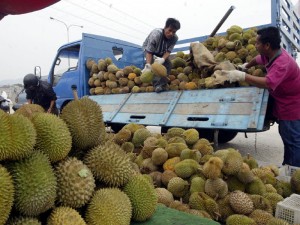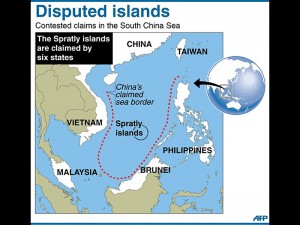
Durians are unloaded from a truck at a bazaar in Kajang on the outskirts of Kuala Lumpur, Malaysia, on Tuesday May 24, 2011. AP
KUALA LUMPUR, Malaysia—Malaysia will start exporting durians to mainland China from July, challenging Thailand’s virtual monopoly on shipments of the spiky, stinky delicacy that many Southeast Asians hail as “the king of fruits.”
The breakthrough Tuesday for Malaysia’s durian growers comes after Chinese Premier Wen Jiabao visited Kuala Lumpur last month and formally agreed to allow the entry of Malaysian durians, which some fans insist are deliciously creamier and more aromatic than Thai-grown ones.
The tropical fruit — distinctive for its thorn-covered green outer rind and pungent smell — is grown in numerous Southeast Asian countries such as the Philippines, Indonesia, Cambodia, Brunei and Vietnam.
But Thailand has dominated the durian trade for more than three decades. It shipped about 138,000 tons (125,000 metric tons) of durians worth nearly $70 million last year to mainland China, which bought nearly 60 percent of Thailand’s global durian exports, according to UN trade statistics.
Malaysian Agriculture Minister Noh Omar said durians will be sent to China during the peak harvesting months between July and September.
Noh did not provide a projection for durian exports to China. Ahmad Ishak, the head of Malaysia’s Federal Agriculture Marketing Authority, told the national news agency Bernama that the country produces about 330,000 tons (300,000 metric tons) of durians a year, mainly for domestic consumption.
“We will export the frozen flesh of two types of durians, comprising fruits with seeds and those without seeds,” Bernama quoted Ahmad as saying.
Thailand maintains a key advantage over Malaysia because its durians can be harvested shortly before they ripen and are sold abroad while still fresh.
Malaysia can only supply frozen exports because its species of durians generally must be allowed to ripen on the tree. Fermentation can change the fruit’s flavor within hours and cause durians to spoil in less than a week.
Nevertheless, Malaysian officials have urged farmers in recent weeks to boost production, promising that demand from China will help prevent any potential glut in the domestic market.
Chinese officials have reportedly visited Malaysian durian plantations in recent months for food safety inspections. Malaysia’s government said it sent a gift of 200 frozen durians to Wen after the Chinese premier indicated his country was ready to import the fruits.


